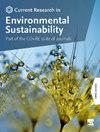From surplus to sustainability: The role of legislation in reducing climate impact from Swedish bread waste
IF 3.8
Q2 ENVIRONMENTAL SCIENCES
Current Research in Environmental Sustainability
Pub Date : 2025-01-01
DOI:10.1016/j.crsust.2025.100301
引用次数: 0
Abstract
Food waste infers considerable environmental, social, and economic consequences. While previous research has focused on interventions at the supplier-retailer interface to reduce surplus, this paper explores the reduction potential in applying legal instruments and evaluates the climate benefits of enforcing four different policy measures: 1) Prohibiting Unfair Trading Practices; 2) Advancing Redistribution of Surplus; 3) Enforcing Best Available Technology; and 4) Legally binding reduction targets. Applied to the case study of bread in Sweden, the results clearly show that, through the enforcement of binding regulations or market-based mechanisms, surplus could be reduced by 6–50 %, while also lowering climate impact with up to 18 % compared to the current system. The results illustrate how Sweden can optimize its bread supply chain through regulatory and market-based strategies, with applicability on an international scale. These findings also highlight the potential in combining legislation and economic incentives to optimize the conventional bread supply chain, for reduced waste and improved surplus management. By demonstrating the benefits of enforcing different legislations and policy measures, the results can be used to further develop and enforce targeted policy recommendations and legislations for reduced food waste. While the scenarios explored are specific to the bread supply chain, the insights gained are applicable to other perishable food sectors facing similar waste management challenges.
从盈余到可持续性:立法在减少瑞典面包浪费对气候的影响中的作用
食物浪费会导致严重的环境、社会和经济后果。虽然以前的研究主要集中在供应商-零售商界面的干预措施以减少盈余,但本文探讨了应用法律工具减少盈余的潜力,并评估了执行四种不同政策措施的气候效益:1)禁止不公平贸易行为;(二)推进剩余再分配。3)执行最佳可用技术;4)具有法律约束力的减排目标。应用于瑞典面包的案例研究,结果清楚地表明,通过执行具有约束力的法规或基于市场的机制,过剩可以减少6 - 50%,同时与现行制度相比,还可以将气候影响降低18%。研究结果说明了瑞典如何通过监管和市场战略优化其面包供应链,并在国际范围内适用。这些发现还强调了将立法和经济激励相结合以优化传统面包供应链、减少浪费和改进剩余管理的潜力。通过展示执行不同立法和政策措施的好处,研究结果可用于进一步制定和执行有针对性的政策建议和立法,以减少食物浪费。虽然所探讨的场景是针对面包供应链的,但所获得的见解适用于面临类似废物管理挑战的其他易腐食品行业。
本文章由计算机程序翻译,如有差异,请以英文原文为准。
求助全文
约1分钟内获得全文
求助全文
来源期刊

Current Research in Environmental Sustainability
Environmental Science-General Environmental Science
CiteScore
7.50
自引率
9.10%
发文量
76
审稿时长
95 days
 求助内容:
求助内容: 应助结果提醒方式:
应助结果提醒方式:


